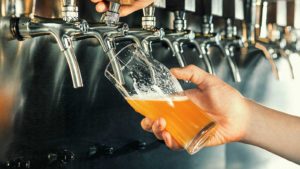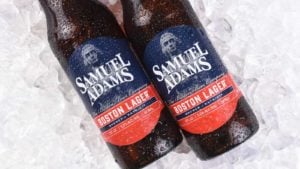Currently, no pure-play publicly traded non-alcoholic beer companies are listed on U.S. stock exchanges or elsewhere. However, there are plenty of alcoholic beverage producers that are taking advantage of the recent boom by adding non-alcoholic beers to their repertoire.
The leading name in alcohol-free beer is Heineken (OTCMKTS:HEINY). It launched Heineken 0.0 in Europe in 2017 and is now available in 110 markets including South Africa, Russia, Vietnam, Japan and Australia. With many positive reviews online from alcohol drinkers and sober people alike, Heineken 0.0 is widely accepted as a good alternative to traditional beer.
“The quality of no-alcohol beer has improved markedly in recent years, products taste much better, are more comparable to full strength equivalents and are more widely available with a lot of marketing spend and campaigns driving awareness,” Fortune reported Susie Goldspink’s comments. Goldspink heads no- and low-alcohol insights at IWSR, a leading alcoholic beverage research firm.
For investors looking to diversify beyond HEINY stock, here are three other non-alcoholic beer stocks to buy.
Keurig Dr Pepper (KDP)

While Keurig Dr Pepper (NASDAQ:KDP) isn’t a pure-play non-alcoholic beer company, it has made a very important investment in one of the biggest players in the U.S. market. In November 2022, Keurig invested $50 million in Athletic Brewing Company, America’s leading non-alcoholic beer maker, as part of the company’s move into emerging beverage categories. KDP received a seat on Athletic’s board as part of its investment.
“Athletic Brewing is a winning brand in a rapidly growing beverage segment. Our investment reflects our interest and ability to move into exciting white spaces, including in the blurring of the alcoholic and non-alcoholic categories,” said Keurig Dr Pepper Executive Chairman Bob Gamgort. “We look forward to partnering with the Athletic Brewing team to help them scale the business.”
Gamgort’s sentiments highlight the benefits for much bigger companies going into business with niche market brands. According to The Wall Street Journal, Athletic Brewing had $90 million in U.S. sales in 2023, putting it ahead of the big brewers, including Heineken and Anheuser-Busch’s (NYSE:BUD) Budweiser.
On the balance sheet, Athletic is part of Keurig’s investments in unconsolidated affiliates. At the end of 2023, that group of assets was valued at $1.39 billion total, with Athletic accounting for less than 3.6%. The biggest unconsolidated affiliate on KDP’s books is its 33.7% stake in Nutrabolt, whose beverage brands include C4 Energy, Cellucor and Xtend.
KDP currently offers an attractive 2.9% dividend yield, so investors can get paid while they wait for Athletic Brewing to help the company become one of the top non-alcoholic beer stocks.
Diageo (DEO)

Diageo (NYSE:DEO) stock has performed poorly over the past five years, down more than 2% compared to an 81.5% gain for the S&P 500. Naturally, analysts hesitate to recommend its stock as a Buy to their clients. Of the 24 covering it, only six rate it a Buy, with five even saying it’s a Sell. However, while Diageo has struggled for many reasons, its Guinness beer brand is not one of them.
In October 2020, the company launched Guinness 0.0 in the UK, a non-alcoholic version of its famous stout beer. Since then, the company launched Guinness 0.0 in the U.S. in July 2022 and Canada in September 2023.
“To create Guinness 0.0 the St James’s Gate brewers start by brewing Guinness exactly as they always have, using the same natural ingredients; water, barley, hops and yeast; before gently removing the alcohol through a cold filtration method. The cold filtration process allows the alcohol to be filtered out without presenting thermal stress to the beer, protecting the integrity of its taste and character,” Diageo said at the time.
While Diageo’s revenues and operating profits were both down in the six months ending Dec. 31, 2023, it still managed to generate $1.46 billion in free cash flow (FCF) in the first half of fiscal 2024, 52% higher than a year earlier. By virtually all financial metrics, Diageo is historically cheap, so now could be a great time for investors to take advantage by buying DEO.
Boston Beer (SAM)

Boston Beer (NYSE:SAM) founder Jim Koch recently appeared on Guy Raz’s podcast How I Built This. On it, he discussed how tasting a Heineken 0.0 at a trade show opened his eyes to the possibilities in non-alcoholic beer that existed for Sam Adams.
In 2021, the company launched Just the Haze, its New England-style non-alcoholic IPA. It’s now one of the country’s top-selling NA beers. In October 2022, it won a gold medal at the 2022 Great American Beer Festival in Denver, beating out more than 80 entrants.
“We figured out a way to make a non-alcoholic beer without damaging the flavor,” Fox News reported Koch’s comments from a March 2023 event. “In the past, non-alcoholic beer was compromised for everybody concerned €” the drinker and the brewer.”
But Just the Haze is a minuscule part of Boston Beer’s product offerings, and business hasn’t been perfect for the parent of Sam Adams beer, Truly hard seltzer, Twisted Tea and Angry Orchard cider. In Q3 2023, the company’s depletions, the rate at which beer leaves its distributors’ warehouses to their off-premise and on-premise customers, declined 3% year-over-year (YOY) on a comparable basis. However, revenue in the quarter increased by 0.9% due to higher prices. Despite the lower depletions, the company still expects 2023 non-GAAP earnings per share of between $7 to $9.
Like Diageo, Boston Beer’s valuation metrics are historically cheap right now. With rising margins, that is unlikely to last long though, so investors should take advantage and buy in now.
On the date of publication, Will Ashworth did not hold (either directly or indirectly) any positions in the securities mentioned in this article. The opinions expressed in this article are those of the writer, subject to the InvestorPlace.com Publishing Guidelines.
Will Ashworth has written about investments full-time since 2008. Publications where he’s appeared include InvestorPlace, The Motley Fool Canada, Investopedia, Kiplinger, and several others in both the U.S. and Canada. He particularly enjoys creating model portfolios that stand the test of time. He lives in Halifax, Nova Scotia.
